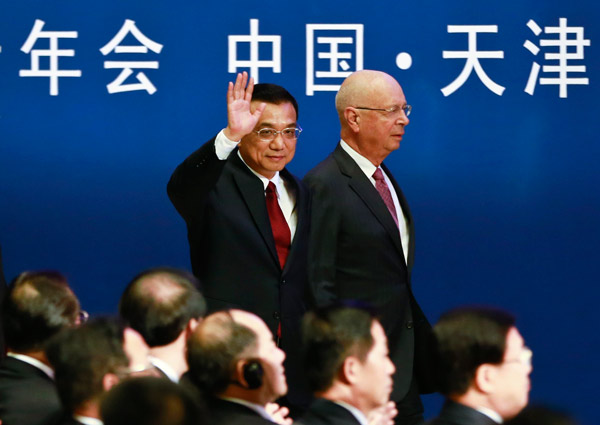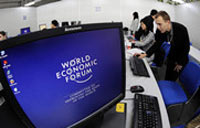 |
|
Premier Li Keqiang and Klaus Schwab, founder and executive chairman of the World Economic Forum, attend the opening ceremony of the Summer Davos forum on Wednesday in Tianjin. [Photo by Feng Yongbin/China Daily] |
Premier Li Keqiang said China will carry out reforms and use macroeconomic tools in the next four months to ease downward pressure and ensure the economy can meet its annual growth targets.
 |
| Special: Summer Davos in Asia |
"In the four months ahead, we will coordinate efforts to stabilize growth and promote reform. ... We have all the confidence, ability and resources to realize the major goals of China's economic development in 2014," the premier said in a keynote speech at the opening ceremony of the World Economic Forum in Tianjin on Wednesday.
China set a growth target of 7.5 percent for the year. Its economy expanded by 7.4 percent in the first half, but the momentum failed to carry over into July, as shown by softening data in industrial output, investment and retail sales.
Li explained that the economic fluctuation in July and August was "inevitable and within expectations", because the domestic and international economic situation was still complex and volatile, and the year-on-year growth was also affected by base figures.
"The Chinese economy is highly resilient and has a lot of potential and ample space to grow, and China has a full range of tools for macro-control at our disposal," Li said.
"When observing the Chinese economy, one should not just focus on its short-term performance or the performance of a particular sector. Rather, one should look at the overall trend, the bigger picture and the total score."
Li stressed that China should focus more on structural adjustment and long-term problems, and refrain from being distracted by the slight short-term fluctuations of individual indicators.
Lutfey Siddiqi, managing director of Swiss financial firm UBS who attended the meeting, agreed with Li that some variables are more important than the headline number of economic expansion.
"China could have a growth target of as low as 6.8 percent next year, and the outside world will understand that," he said.
"We'll still need more stimulus and targeted stimulus, but as the size of the economy grows, the rate of change has to slow down. The overall growth rate is less meaningful, especially when you can rotate the engine of the growth to service and consumption, or if you can put more welfare programs in place, maintain employment, keep inflation (under control)."
"The market will understand this. In fact, the market probably will be more concerned if the target was still set at 7.5 percent next year," he said.
Li Gong, chairman of Accenture Greater China, said streamlining administration will create a better environment for the development of small and medium-sized enterprises, which usually have higher rates of return on investment and should get more funding.
Simon Henry, executive director of the board of Royal Dutch Shell, said it takes time to access the Chinese market. Although the direction is right and things will become easier, it's never easy to enter any new market.
Henry said China set the expectations very high, and it will take time to develop, as it's a large and complex economy. "Changes do not happen quickly, but the direction is generally positive," he said.
Contact the writer at [email protected]
Bao Wanxian contributed to this story.